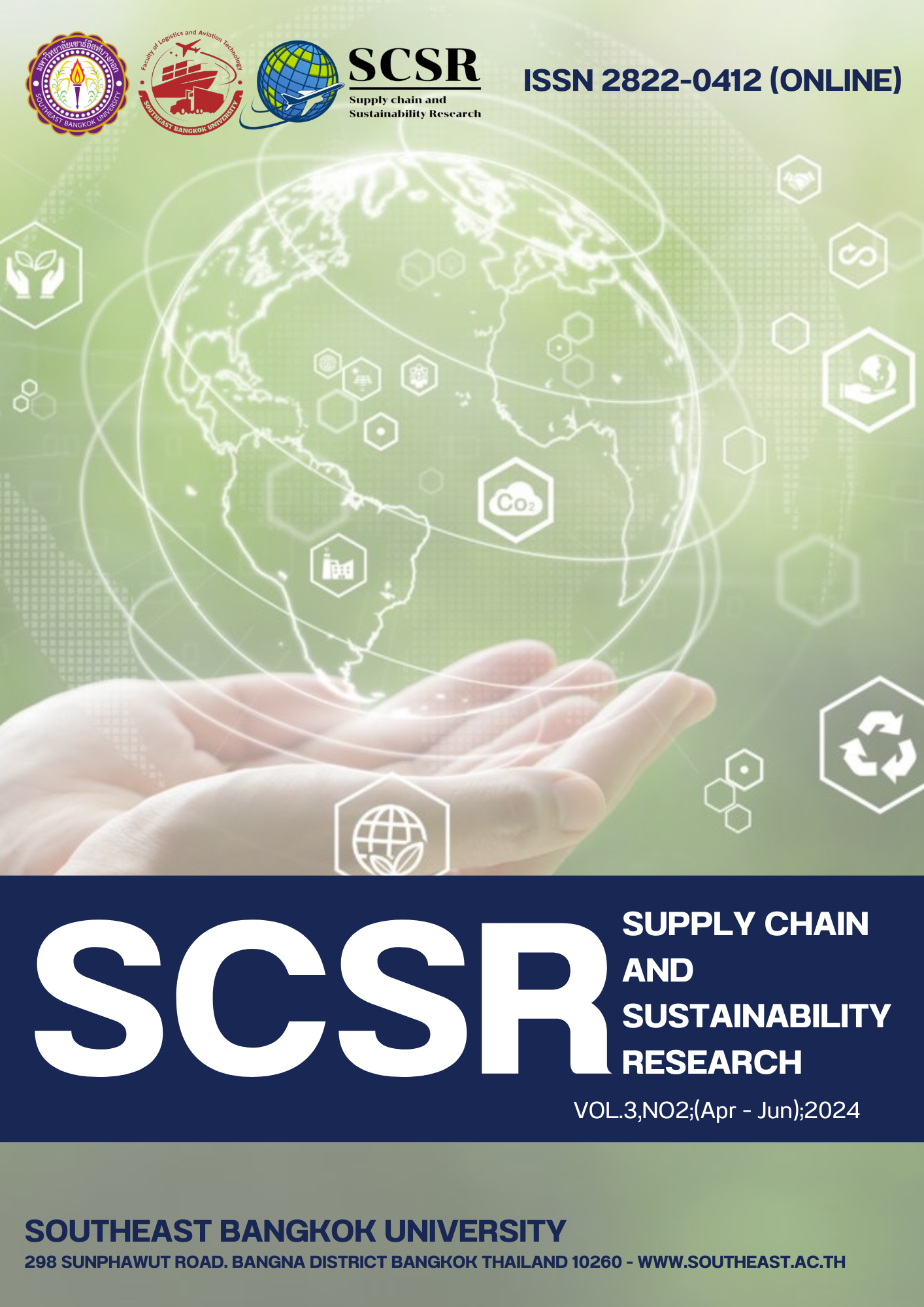Strategies, practices and observations of green tourism supply chain Taking the promotion of GDMO in Tamlan area as an example
Main Article Content
บทคัดย่อ
Tourism phenomena impact nature, humanity, society, and industry, focusing increasingly on people-to-people contact and community-based experiences. Recent trends emphasize participatory and unique tourism, fostering interactions between tourists and residents, and promoting warmth and mutual assistance. From a green tourism perspective, these trends offer opportunities to protect culture, promote social equality, and practice sustainable economies. The Tamlan Ancient Trail, spanning northern Taiwan for centuries, connects Tamsui Hall and Kamalan Hall, reflecting ancestral values of sustainability. This study explores "green tourism" and proposes the GDMO (Green Destination Management and Marketing Organization) framework, using Tamlan Town to support local development through creativity, innovation, and entrepreneurship. By integrating industries and communities, the study aims to enhance the ecological, cultural, and economic sustainability of Tamlan's leisure tourism. With a focus on strategic planning and community participation, this research provides practical insights into improving the depth and sustainability of tourism experiences. The GDMO model demonstrates the potential for achieving green economic value, social impact, environmental conservation, and cultural preservation.
Article Details

อนุญาตภายใต้เงื่อนไข Creative Commons Attribution-NonCommercial-NoDerivatives 4.0 International License.
บทความนี้ได้รับการเผยแพร่ภายใต้สัญญาอนุญาต Creative Commons Attribution-NonCommercial-NoDerivatives 4.0 International (CC BY-NC-ND 4.0) ซึ่งอนุญาตให้ผู้อื่นสามารถแชร์บทความได้โดยให้เครดิตผู้เขียนและห้ามนำไปใช้เพื่อการค้าหรือดัดแปลง หากต้องการใช้งานซ้ำในลักษณะอื่น ๆ หรือการเผยแพร่ซ้ำ จำเป็นต้องได้รับอนุญาตจากวารสารเอกสารอ้างอิง
Chen, J. (2019). Analyzing the legality of small travel-method-purpose chain perspective (Master's thesis). National Jinan International University, Emerging Industry Strategy and Development.
Gao. W. (2020). Research on local tourism development: Taking the promotion of "regional limited tourism industry" and "DMO" in Kunigami Village, Okinawa Prefecture, Japan as an example (Master's thesis). Southeast University of Science and Technology, Institute of Industrial Management.
Huang, S. (2019). New Generation Tourism Destination Competitiveness Index: Indicator framework, evaluation methods and comprehensive improvement strategies (PhD thesis). National Taipei University, Institute of Urban Planning.
Lu, G. (2020). Research on the effectiveness of the implementation of green tourism certification: Taking Sancai Ganoderma Ecological Farm B&B as an example (Master's thesis). Southeast University of Science and Technology, Institute of Industrial Management.
Tao, Y. H. (2012). Business opportunities for green farms in a sustainable society. Leisure Agriculture Industry Review, 2.
Tao, Y. H. (2012). Research on sustainable tourism communities on Taiwan's coast: Taking Yehliu as an example. Proceedings of the 8th International Academic Symposium on Tourism Frontiers "Tourism and Global Change", Nanjing, China.
Tao, Y. H. (2015). Design and discovery of integrated curriculum of tourism and volunteer service. Proceedings of the Cross-Strait Academic Seminar on Integrated Curriculum and General Education, Taipei, Taiwan.
Tao, Y. H. (2019a). Issue analysis of the application of green tourism concepts in rural areas: Taking Shiding as an example. Interdisciplinary Integration Monthly, 90–95.
Tao, Y. H. (2019b). Issue analysis of the application of green tourism concepts in rural local creation: Taking Shiding as an example. Interdisciplinary Integration Monthly, 4(6), 90–95.
Tao, Y. H. (2019c). Research on the formulation of agricultural green tourism guidelines and the implementation status of leisure farms in Taiwan. Proceedings of the 2019 Cross-Strait Cultural Tourism Industry Seminar, Jiangyin, China.
Tao, Y. H. (2020). Green tourism practice and label certification. Journal of Leisure and Recreation Management, 7(1), 1–20.
Tao, Y. H., Wang, R., Ling, H., Chu, J., & Ji, H. (2021). Implementing innovative management of green tourism and leisure agriculture in Taiwan. The International Journal of Organizational Innovation, 13(3), 1–12.
Tao, Y. H., & Ren, P. (2013). Construction and promotion of green tourism standards. Proceedings of the 3rd Green Tourism Symposium, Tamsui, Taiwan.
Tao, Y. H., Wu, Y., & Ren, P. (2010). Definition, principles, and practices of green tourism. Proceedings of the 1st Taiwan Green Tourism Symposium, Taipei, Taiwan.
Tao, Y. H., & Yang, T. (2010). Climate change, sustainable development, and green tourism. Proceedings of the 1st Taiwan Green Tourism Symposium, Taipei, Taiwan.
Wang, X. (2019). Research on the promotion effect of Japanese version of DMO on tourism management: Taking Snow Country Tourism Circle and Yatsugatake Tourism Circle as examples (Master's thesis). National Chengchi University, Japanese Studies Degree Program.
Wu, J. (2021). Research on the promotion of green tourism: Taking Pingxi and Jingtong areas along the Pingxi Line Railway as examples (Master's thesis). Southeast University of Science and Technology, Institute of Industrial Management.
Wu, Y., Chen, L., Tao, Y. H., & Wu, J. (2011). Discussion on the potential of promoting green tourism in Taipei City. Proceedings of the 3rd Asia-Pacific Hospitality and Tourism Education Alliance and the 11th Tourism, Leisure and Hospitality and Tourism Industry Sustainable Management Academic Symposium, Kaohsiung, Taiwan.
Xu, B. (2022). Using local co-creation techniques to create a Gaoshu tourism marketing organization (Master's thesis). National Pingtung University, Hakka Cultural Industry Master's Program.


